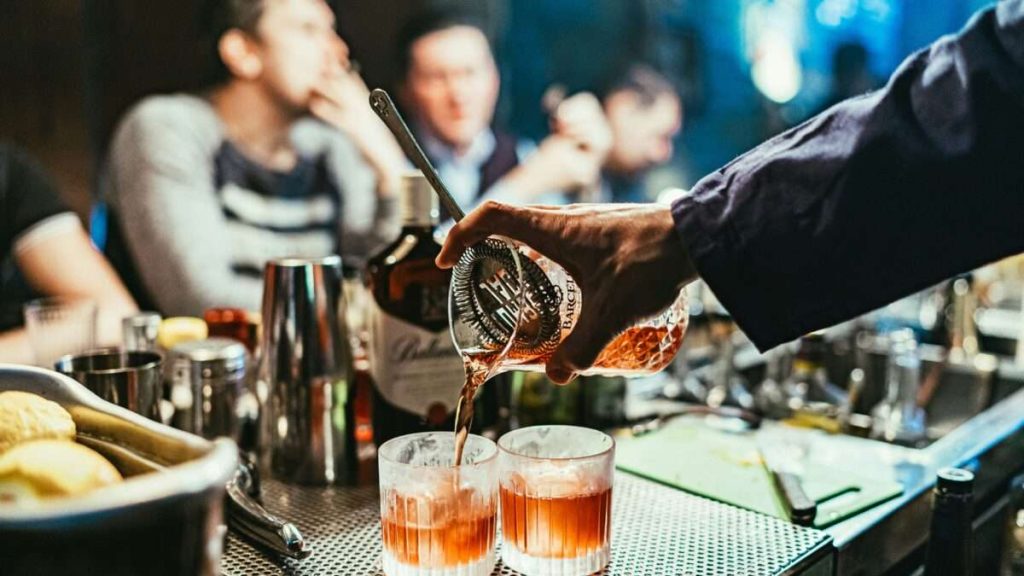Some bars and restaurants that got in trouble for breaking the state government’s COVID-19 closure orders are still being hounded by the Pennsylvania Liquor Control Board (PLCB).
Now, some state lawmakers have a message for the liquor regulators: “Back off!”
Bills introduced recently in the state House and state Senate would extend amnesty to bars, restaurants, and other venues with liquor licenses that may have racked up COVID-era violations. Specifically, the bills would prohibit the PLCB from revoking or suspending any liquor license due to a failure to comply with COVID-19 orders from the state’s governor and Department of Health, and they would force the PLCB to remove any disciplinary actions already taken against licensees.
The collection of bills is a response to the PLCB’s practice of imposing “conditional licensing agreements” on establishments that ran afoul of Pennsylvania’s strict lockdown rules during the pandemic.
As Reason has previously reported, some of those violations were for ticky-tack offenses. One York County tavern was written up multiple times by PLCB agents for things as innocuous as allowing a band to use the bar’s power supply for an outdoor concert, and for a private indoor gathering at a time when bars were required to be closed to the public. When that tavern’s owners tried to renew their license with the PLCB last year, they were forced to sign a conditional licensing agreement that has resulted in higher insurance premiums and that comes with the risk of losing their license if another violation occurs.
“The Liquor Control Board has the opportunity to move on from the unilateral and subjective rules in place during the pandemic that destroyed lives and livelihoods, especially our locally owned businesses, but they appear fixated on relitigating the past which will continue to make these small businesses suffer even more,” state Sen. Kristin Phillips-Hill (R–York), a co-sponsor of one of the bills, told Reason. Senate President Kim Ward (R–Westmoreland) has signed on to support Phillips-Hill’s proposal, a signal that it could move quickly through the Republican-controlled chamber.
Prior to the pandemic, the PLCB used conditional licensing agreements to crack down on nuisance bars or establishments with a track record of selling to underage customers. Since January 2022, however, the board has approved dozens of conditional licensing agreements based on COVID-era violations alone. “The people who violated the governor’s mandates and orders should face some consequences,” argued Mary Isenhour, one of the PLCB’s three board members, at a January 2022 meeting where the first of those agreements was approved.
At a hearing last month, Phillips-Hill blasted the PLCB’s top brass for the board’s handling of the COVID-era violations.
“The dilemma that we faced is that most licensees in the commonwealth adhered to the rules and sacrificed their income, sacrificed their businesses in some cases,” said PLCB Chairman Tim Holden in response. “How is it fair to the establishments that played by the rules…compared to the establishment that ignored everything and kept operating?”
That is, in fairness, a somewhat difficult question. But it ignores some important facts, like the minor violations that landed some bars in hot water with the PLCB, and the reality of Pennsylvania’s COVID-19 lockdowns, which were some of the strictest in the country and prompted the passage of a state constitutional amendment stripping some emergency powers from the executive branch.
State Rep. Russ Diamond (R–Lebanon) says the amnesty effort is necessary so the state and its residents can move on from a dark period. In addition to granting amnesty to bars and other establishments with liquor licenses, he’s introduced a similar bill granting amnesty to all professions governed by state licensing boards.
“Society has been suffering from a collective form of PTSD as a result of the heavy-handed Covid mitigation efforts imposed by the government,” Diamond told Reason. The amnesty bills, he says, are “the least we can do to help to heal those lingering wounds and move forward as a healthy society.”
Four years after the pandemic began, public officials have the benefit of hindsight and lots of information that may have been lacking during the chaotic days in March 2020. Ordering businesses to close never made much sense, but continuing to punish businesses that managed to survive the pandemic (and the government’s response to it) isn’t helping anyone.
Even Gov. Josh Shapiro, a Democrat who was elected to that office in 2022 after defending Pennsylvania’s COVID lockdown orders in court when he was the state’s attorney general, has admitted that officials “got it wrong” in the early days of the pandemic. For everyone’s sake, it seems best to acknowledge that mistakes were made—not to continue enforcing misguided rules.
“I firmly believe we need to move on from enforcing unilateral shutdowns,” says Phillips-Hill, “just like the voters decided to do when they amended their state constitution nearly three years ago.”
The post Pennsylvania Lawmakers Aim To Grant Amnesty To Bars That Violated COVID Lockdown Orders appeared first on Reason.com.







